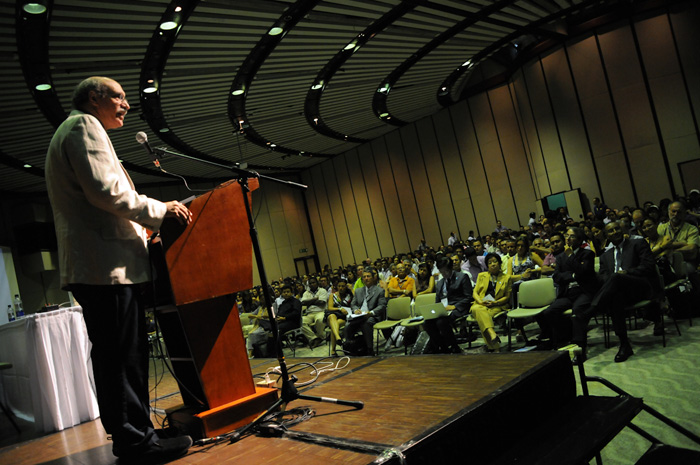Wasserman, Honorary President of the Congress, was one of the persons in charge of the event"s opening ceremony, which reunited important scientists from all over the world, from different areas, including the Chemistry Nobel Prize winner in 2008, the American Biologist Martin Chalfie.
The president of Universidad Nacional de Colombia affirmed that chemistry is one of the necessary areas for the country to generate social development and change in many aspects.
"Today, there are many careers with direct contact with chemistry. As professor Peter Atkins said in his book Atkins molecules, chemistry is the axis of all sciences, since it provides all the explanations for almost all problems of life, it mixes with many other areas, even physics. It is possible to affirm that chemistry unites the familiar things with the fundamental ones," said Wasserman, one of the most recognized chemists in the country.
One of the main objectives of the 29th Latin-American Congress of Chemistry is to show the different connections this area of knowledge has with the reality around us. What we know, the medicines that cure us, what wraps our food (plastics), what cleans our world (detergents), fragrances, sex, evolution and all in which we focus our attention is connected to chemistry.
The President of Universidad Nacional de Colombia affirmed that Colombia began to have important advances to position science, technology and innovation as a real development factor.
"At this moment, in the Congress of the Republic, several discussions are taking place about the royalties" project and the destination of the 10% budget for science and technology, which is an important opportunity for the academic sector. If the behavior of this sector continues as planned, we have to double the investment in science and technology," asserted Wasserman.
Meanwhile, Joseph Francisco, from the American Association of Chemistry, which counts on close to 160 thousand members, affirmed that chemistry is an area with a lot of world challenges in economic, social and biological terms aforementioned.
"We need an interdisciplinary work in all areas of chemistry to face problems such as lack of water, biodiversity, diseases, etc. These meetings are important, since they are a space to dialogue, which can be useful for new chemist to know the world in which they are going to interact," affirmed the American scientist.
In the opening ceremony of the Congress, the President of the Latin-American Federation of Chemistry Associations, the Puerto Rican Carlos Tollinche, also participated. He said that the event, which is taking place in Cartagena de Indias, is one of the very first ones to start celebrating the International Year of Chemistry in 2011.
In addition, the president of the International Union of Pure and Applied Chemistry, the Japanese Kazuyuky Tatsumi, was also present in the ceremony. He invited all the chemistry associations in Latin-America to find ways and to join this important international organism that gathers the most important scientist in this area in the world.
Sedes
 Correo Electrónico
Correo Electrónico
 DNINFOA - SIA
DNINFOA - SIA
 Bibliotecas
Bibliotecas
 Convocatorias
Convocatorias
 Identidad UNAL
Identidad UNAL



